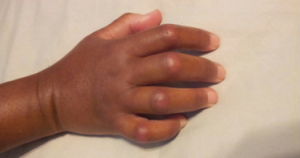As part of her evaluation for the procedure, she discovered that she had a problem with her heart valve related to her lupus, which motivated her even more to explore HSCT. She was eventually accepted as part of the HSCT trial, but she couldn’t get her insurance to approve it. “We [had] to pay out of pocket. They strung it out for months. This whole time I was thinking, ‘What if my heart is getting worse?’ So my mom and dad said, ‘We are going to do whatever we have to do to get the money. We aren’t waiting on insurance.’”
Experts generally agree that autologous HSCT is often able to induce sustained clinical remission in people with lupus. However, many of the currently available studies of HSCT in patients with lupus have shown an increase in short-term mortality.10
Ms. Peel went through the procedure in July 2016. Since the procedure, she has been able to stop taking all of her medications for lupus. Her lung function and overall health have improved. “What I went through in those three months has given me a year of my life at this point that I didn’t have before,” she explains. “I’ve missed a lot with my kids. My relationship suffered. It takes a toll on everybody around you, not just you as a person.”
Ms. Peel says her local doctor did not support her exploring HSCT as a possibility. She adds that doctors need to consider quality-of-life issues as they talk through possible treatment options with their patients. “They need to understand that just because the person is living that that is not true living. If they are to a point like I was—there was nothing left for me to do but this.”
Although [hematopoietic stem-cell transplantation] has a great deal of potential, many clinicians are concerned about the risk/benefit ratio of the procedure. The conditioning regimen puts patients at risk of complications, including infection, secondary autoimmune disease & malignancy.
HSCT & Stiff Person Syndrome: Whitney Blake is a 32-year-old journalist. For almost 10 years, she has experienced symptoms of stiff person syndrome (SPS). This condition is incredibly rare, occurring in perhaps one or two people per million, although it may be underdiagnosed.11,12

Ms. Gould underwent HSCT in summer 2016, after this photo was taken.
SPS causes increasingly severe muscle stiffness, rigidity and spasms of the axial muscles. Ultimately, it can cause significant disability and occasionally acute respiratory failure.13 The syndrome is thought to have an autoimmune basis, with the large majority of patients having glutamic acid decarboxylase (GAD) autoantibodies. Benzodiazepines and other GABA-acting medications can be used to help with stiffness and spasms, along with muscle relaxants and immune-modulating therapies like IVIG and plasma exchange.11,12
